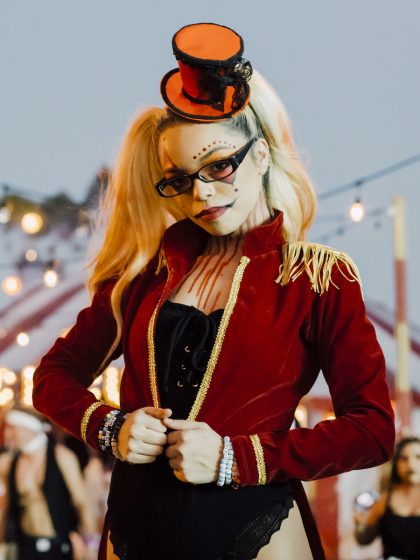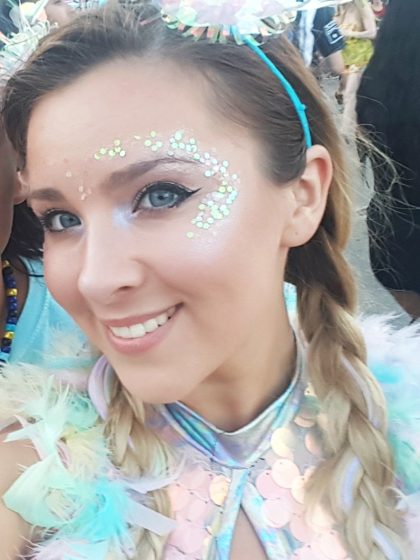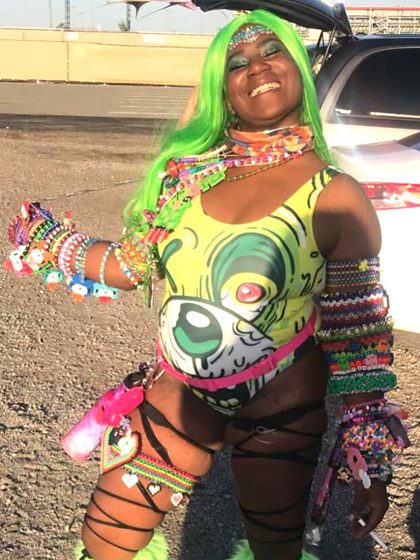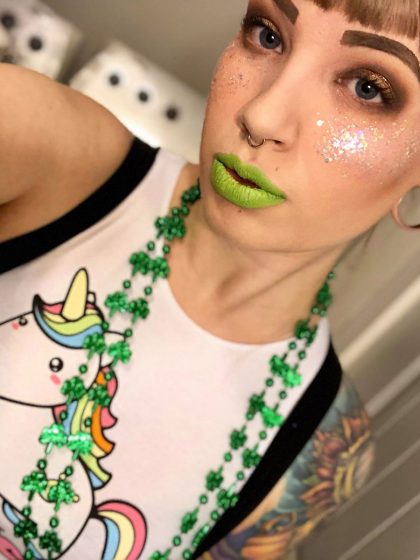A Lesson in Music Therapy: How Dance Music Helped Me See the Light Again
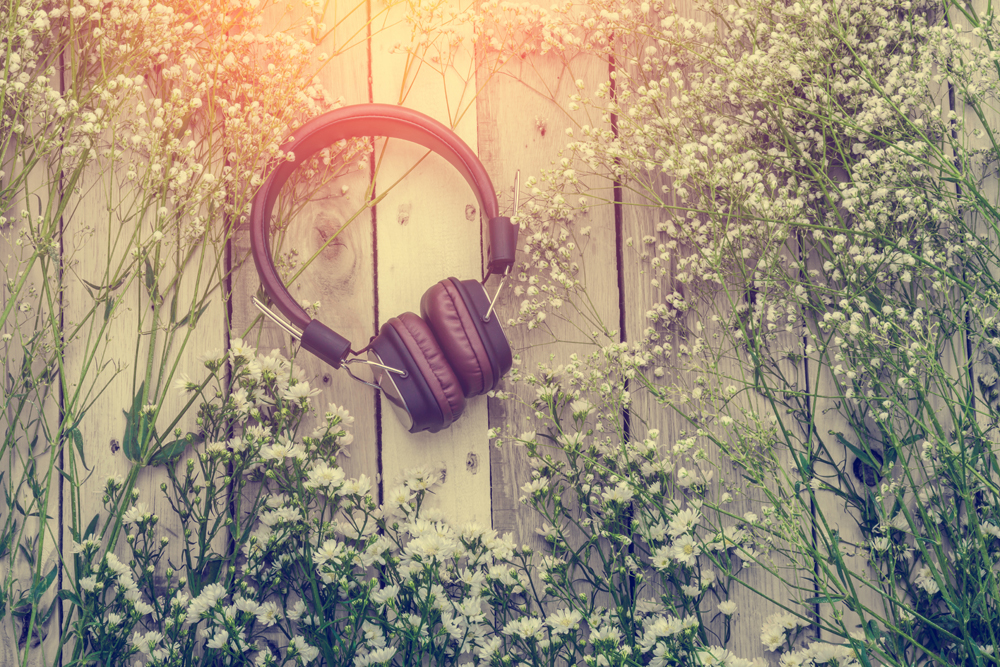
My heart is pumping steadily, faster and faster. An iron vice grips it as I feel the pain in my chest begin to explode, tightening slowly, constricting me like a giant python wrapping itself around my body.
I feel a hot flash coming to my face, and I know it’s only moments away. I try and think calming thoughts: bunnies, my boyfriend, home, pizza, the first time I rode a bike. But all I can see—all I can feel—is the swirling flurry of rushed thoughts bombarding my head, rushing in like so many stampedes.
All I can feel is terror. I can’t focus. Each thought passes through my mind with incredible speed, rushing through, cutting me up like blades. What’s happening? I can’t breathe. I have to do something… anything.
I grab my headphones and put on MK’s remix of “My Head Is a Jungle” and turn it up as loud as I can, jamming it onto my head as quickly as possible.
To my utter amazement, my heart—having been pounding away furiously—begins to do something else: It starts syncing up to the music. The percussion. I close my eyes.
“We’re moving slow / our hearts beat so fast.”
I manage to take a deep breath. I feel my body beginning to relax, the python on my chest starting to slowly slither away.
What was happening?
“I was speaking soft / See the pain in your eyes / I’ve been feeling, feeling for you, my love.”
While I wish I could say this panic attack was a one-time incident, it’s something that happens often—far too often—in my life.
I’ve been diagnosed with bipolar disorder and post-traumatic stress disorder. Outside of my journals (collected over many years and eagerly read by my younger siblings), this is the first time I’ve ever dared to write about my struggle with depression and anxiety. I’m still nervous as I write this piece. But in the end, if even one aspect of my experience helps someone out there—anyone out there that feels alone—then I’ll consider this a success.
So, what is it exactly about that song that made my heart stop pounding?
It got me out of my head.
Depression is like a parasite: It can’t survive without feeding on a healthy host from within. For me, this manifested itself like paralysis. I was just too tired, all of the time—too tired to wake up, tired of trying to force myself into social situations that made my skin crawl, tired of trying to stop the onslaught of rushing thoughts, tired of trying to look normal.
But of course, at the time—a lonely freshman in college 400 miles from home with no friends to speak of—I didn’t realize all this. I just thought there was something inherently wrong with me, something that no combination of therapists, medication and venting to my friends could fix. At a certain point, I was even too tired to try anything new—too tired to even try to love myself. 
I didn’t realize it was a parasite that needed me to survive. I just thought it was a curse, something I had to endure forever, alone.
In the summer of 2012, I arrived in the city of Brighton, England, for a six-month study-abroad course, more depressed than I had ever been in my life. Everything started to peel away slowly. I no longer craved food or cared about my safety. I delighted in going out on the town alone; I cut myself and burned cigarettes onto my arms.
Farther away from home than ever before, I had forgotten that anyone, including myself, cared at all about me.
I stumbled into the club alone, half drunk, taking a look around the area. I had never liked clubbing much in the US; it reeked of desperation and sex to me. But this took me aback.
This bass—pumping into my heart, through the walls, which made everything reverberate—was new, somehow. Not the bass of my youth, but a new type of music altogether.
It was almost as though I was listening to music for the very first time. Even though I didn’t know a soul in the club, I felt connected to the music. I felt like the bass was the heart of the club, beating in sync with everyone else, dancing euphorically, shouting, laughing, moving so freely, beating along with my heart.
I felt so very alive in that moment in a way I never had before, connected to everyone on a basic level that went beyond speech. In the club, dancing to Ben Pearce’s “What I Might Do,” everyone knew each other. Every face grinned at you; every group invited you to dance. It wasn’t the hookup culture I was so familiar with back home. It was just people that genuinely loved to dance.
This new atmosphere gave me a sense of courage I’d never had before. I’d always wanted to dance (and loved doing it in front of the mirror, post-shower) but was always too afraid of what others might think. Emboldened by it, feeling like I was a new person, feeling sexy and animated, I began to chat with a few people.
I would turn out to not only meet my current boyfriend that night—four years ago in England, over 5,000 miles away—but the people that would soon become my closest, dearest friends in the world.
To this day, every time I hear Calvin Harris’ “Feel So Close,” I can see myself in that world as though it were in front of me. It never fails to inspire the most vivid, joyful memories I’ve ever had of dancing my heart out on the club floor, singing along and reveling in just how strange and wonderful life could be. There was no judgment, no criticism, no drama—just love.
The brain is hardwired to love music. Research shows that while you’re listening to a song that really inspires you—something that emotionally affects you enough to send chills down your spine—it triggers a massive release of dopamine to your system, aka the “feel-good” hormone.
I was also fascinated to learn that the anticipation of what you’re about to hear also signals another rush of dopamine to the brain’s reward system. This was much more interesting. If I was sad, anxious or upset, even the thought of going away to listen to music helped soothe me slightly. Listening to electronic music—especially the UK garage sound that I loved so much—could bring me back to a happy memory, could provoke a powerful surge of energy, could even help me get outside my comfort zone. It became a daily ritual for me to just plug in and let the music take over, to let the steady rhythms force my body out of its ritual paralysis, to inspire me to get out of my head and into the real world.
It took time, but slowly and surely, I began to love myself.
Against my misgivings, I started going to festivals. Seeing the open environment—seeing how friendly people were, how determined everyone was to just enjoy themselves and celebrate life—did something for me that no medication could ever touch. I began to feel confident enough about my body to wear outfits I would have never dreamed of, knowing that no one would judge me. And I was right. As I came to experience infinite kindness from so many strangers, I began to see all the love in the world that my parasite had hidden from me.
It was so, so beautiful, and I wanted to see more of it.
I’m not scared anymore. I’m ready. My heart’s open, willing, waiting for the beat, that hypnotic rhythm that I can listen to and know that wherever I am, I am home.

